2016年高考英语全国新课标卷III试卷与答案
- 格式:doc
- 大小:1.81 MB
- 文档页数:18
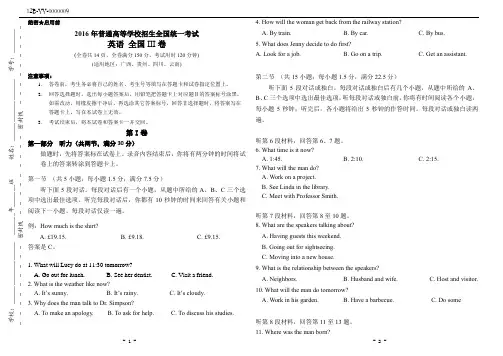
学校:____________________ _______年_______班 姓名:____________________ 学号:________- - - - - - - - - 密封线 - - - - - - - - - 密封线 - - - - - - - - -绝密★启用前2016年普通高等学校招生全国统一考试英语 全国III 卷(全卷共14页,全卷满分150分,考试用时120分钟)(适用地区:广西、贵州、四川、云南)注意事项:1.答卷前,考生务必将自己的姓名、考生号等填写在答题卡和试卷指定位置上。
2. 回答选择题时,选出每小题答案后,用铅笔把答题卡上对应题目的答案标号涂黑。
如需改动,用橡皮擦干净后,再选涂其它答案标号,回答非选择题时,将答案写在答题卡上,写在本试卷上无效。
3.考试结束后,将本试卷和答案卡一并交回。
第I 卷第一部分 听力(共两节,满分30分)做题时,先将答案标在试卷上。
录音内容结束后,你将有两分钟的时间将试卷上的答案转涂到答题卡上。
第一节 (共5小题;每小题1.5分,满分7.5分)听下面5段对话。
每段对话后有一个小题,从题中所给的A 、B 、C 三个选项中选出最佳选项。
听完每段对话后,你都有10秒钟的时间来回答有关小题和阅读下一小题。
每段对话仅读一遍。
例:How much is the shirt?A. £19.15.B. £9.18.C. £9.15.答案是C 。
1. What will Lucy do at 11:30 tomorrow? A. Go out for lunch. B. See her dentist. C. Visit a friend.2. What is the weather like now? A. It’s sunny. B. It’s rainy. C. It’s cloudy.3. Why does the man talk to Dr. Simpson? A. To make an apology.B. To ask for help.C. To discuss his studies.4. How will the woman get back from the railway station?A. By train.B. By car.C. By bus. 5. What does Jenny decide to do first?A. Look for a job.B. Go on a trip.C. Get an assistant.第二节 (共15小题;每小题1.5分,满分22.5分)听下面5段对话或独白。
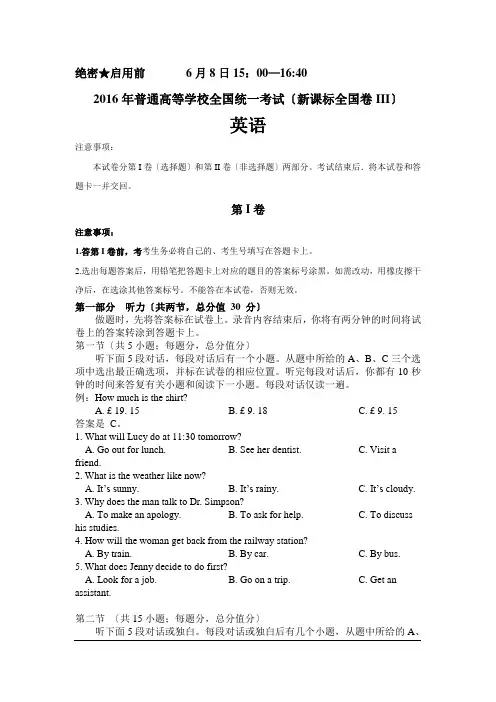
绝密★启用前6月8日15:00—16:402016年普通高等学校全国统一考试〔新课标全国卷III〕英语注意事项:本试卷分第I卷〔选择题〕和第II卷〔非选择题〕两部分。
考试结束后.将本试卷和答题卡一并交回。
第I卷注意事项:1.答第I卷前,考考生务必将自己的、考生号填写在答题卡上。
2.选出每题答案后,用铅笔把答题卡上对应的题目的答案标号涂黑。
如需改动,用橡皮擦干净后,在选涂其他答案标号。
不能答在本试卷,否则无效。
第一部分听力〔共两节,总分值30 分〕做题时,先将答案标在试卷上。
录音内容结束后,你将有两分钟的时间将试卷上的答案转涂到答题卡上。
第一节〔共5小题;每题分,总分值分〕听下面5段对话,每段对话后有一个小题。
从题中所给的A、B、C三个选项中选出最正确选项,并标在试卷的相应位置。
听完每段对话后,你都有10秒钟的时间来答复有关小题和阅读下一小题。
每段对话仅读一遍。
例:How much is the shirt?A. £ 19. 15B. £ 9. 18C. £ 9. 15答案是C。
1. What will Lucy do at 11:30 tomorrow?A. Go out for lunch.B. See her dentist.C. Visit a friend.2. What is the weather like now?A. It’s sunny.B. It’s rainy.C. It’s cloudy.3. Why does the man talk to Dr. Simpson?A. To make an apology.B. To ask for help.C. To discuss his studies.4. How will the woman get back from the railway station?A. By train.B. By car.C. By bus.5. What does Jenny decide to do first?A. Look for a job.B. Go on a trip.C. Get an assistant.第二节〔共15小题;每题分,总分值分〕听下面5段对话或独白。

绝密★启用前 6 月 8 日15:00—16:402016 年普通高等学校全国统一考试(新课标全国卷 III)英语注意事项:本试卷分第 I 卷(选择题)和第 II 卷(非选择题)两部分。
考试结束后.将本试卷和答题卡一并交回。
第 I 卷注意事项:1.答第 I 卷前,考考生务必将自己的姓名、考生号填写在答题卡上。
2.选出每小题答案后,用铅笔把答题卡上对应的题目的答案标号涂黑。
如需改动,用橡皮擦干净后,在选涂其他答案标号。
不能答在本试卷,否则无效。
第一部分听力(共两节,满分30 分)做题时,先将答案标在试卷上。
录音内容结束后,你将有两分钟的时间将试卷上的答案转涂到答题卡上。
第一节(共 5 小题;每小题 1.5 分,满分 7.5 分)听下面 5 段对话,每段对话后有一个小题。
从题中所给的 A、B、C 三个选项中选出最佳选项,并标在试卷的相应位置。
听完每段对话后,你都有 10 秒钟的时间来回答有关小题和阅读下一小题。
每段对话仅读一遍。
例:How much is the shirt?A. £ 19. 15B. £ 9. 18C. £ 9. 15答案是 C。
1.What will Lucy do at 11:30 tomorrow?A.Go out for lunch.B. See her dentist.C. Visit a friend.2.What is the weather like now?A.It’s sunny.B. It’s rainy.C. It’s cloudy.3.Why does the man talk to Dr. Simpson?A.To make an apology.B. To ask for help.C. To discuss his studies.4.How will the woman get back from the railway station?A.By train.B. By car.C. By bus.5.What does Jenny decide to do first?A.Look for a job.B. Go on a trip.C. Get an assistant.第二节(共 15 小题;每小题 1.5 分,满分 22.5 分)听下面 5 段对话或独白。
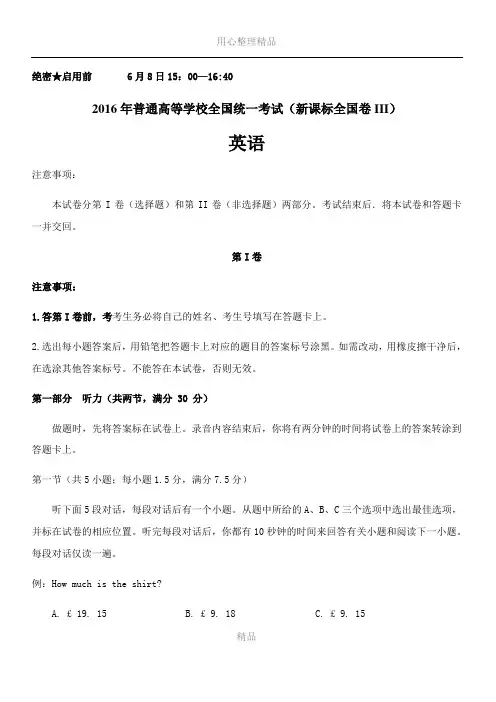
绝密★启用前 6月8日15:00—16:402016年普通高等学校全国统一考试(新课标全国卷III)英语注意事项:本试卷分第I卷(选择题)和第II卷(非选择题)两部分。
考试结束后.将本试卷和答题卡一并交回。
第I卷注意事项:1.答第I卷前,考考生务必将自己的姓名、考生号填写在答题卡上。
2.选出每小题答案后,用铅笔把答题卡上对应的题目的答案标号涂黑。
如需改动,用橡皮擦干净后,在选涂其他答案标号。
不能答在本试卷,否则无效。
第一部分听力(共两节,满分 30 分)做题时,先将答案标在试卷上。
录音内容结束后,你将有两分钟的时间将试卷上的答案转涂到答题卡上。
第一节(共5小题;每小题1.5分,满分7.5分)听下面5段对话,每段对话后有一个小题。
从题中所给的A、B、C三个选项中选出最佳选项,并标在试卷的相应位置。
听完每段对话后,你都有10秒钟的时间来回答有关小题和阅读下一小题。
每段对话仅读一遍。
例:How much is the shirt?A. £ 19. 15B. £ 9. 18C. £ 9. 15答案是 C。
1. What will Lucy do at 11:30 tomorrow?A. Go out for lunch.B. See her dentist.C. Visit a friend.2. What is the weather like now?A. It’s sunny.B. It’s rainy.C. It’s cloudy.3. Why does the man talk to Dr. Simpson?A. To make an apology.B. To ask for help.C. To discuss his studies.4. How will the woman get back from the railway station?A. By train.B. By car.C. By bus.5. What does Jenny decide to do first?A. Look for a job.B. Go on a trip.C. Get an assistant.第二节(共15小题;每小题1.5分,满分22.5分)听下面5段对话或独白。
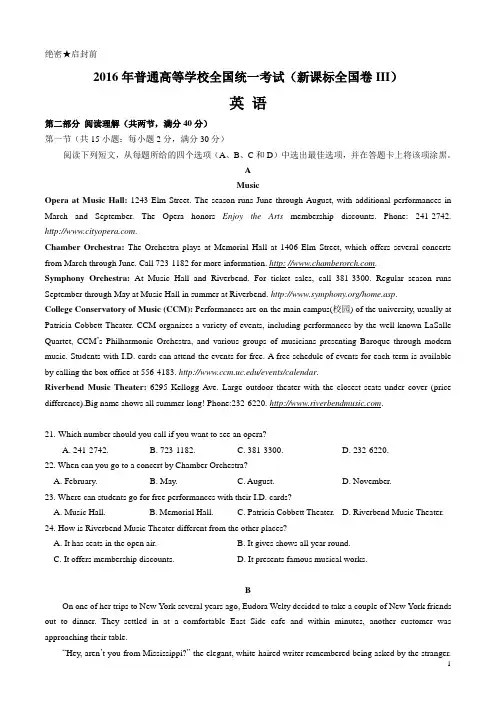
绝密★启封前2016年普通高等学校全国统一考试(新课标全国卷III)英语第二部分阅读理解(共两节,满分40分)第一节(共15小题:每小题2分,满分30分)阅读下列短文,从每题所给的四个选项(A、B、C和D)中选出最佳选项,并在答题卡上将该项涂黑。
AMusicOpera at Music Hall: 1243 Elm Street. The season runs June through August, with additional performances in March and September. The Opera honors Enjoy the Arts membership discounts. Phone: 241-2742. .Chamber Orchestra: The Orchestra plays at Memorial Hall at 1406 Elm Street, which offers several concerts from March through June. Call 723-1182 for more information. .Symphony Orchestra: At Music Hall and Riverbend. For ticket sales, call 381-3300. Regular season runs September through May at Music Hall in summer at Riverbend. /home.asp.College Conservatory of Music (CCM): Performances are on the main campus(校园) of the university, usually at Patricia Cobbett Theater. CCM organizes a variety of events, including performances by the well-known LaSalle Quartet, CCM’s Philharmonic Orchestra, and various groups of musicians presenting Baroque through modern music. Students with I.D. cards can attend the events for free. A free schedule of events for each term is available by calling the box office at 556-4183. /events/calendar.Riverbend Music Theater: 6295 Kellogg Ave. Large outdoor theater with the closest seats under cover (price difference).Big name shows all summer long! Phone:232-6220. .21.Which number should you call if you want to see an opera?A. 241-2742.B. 723-1182.C. 381-3300.D. 232-6220.22. When can you go to a concert by Chamber Orchestra?A. February.B. May.C. August.D. November.23. Where can students go for free performances with their I.D. cards?A. Music Hall.B. Memorial Hall.C. Patricia Cobbett Theater.D. Riverbend Music Theater.24. How is Riverbend Music Theater different from the other places?A. It has seats in the open air.B. It gives shows all year round.C. It offers membership discounts.D. It presents famous musical works.BOn one of her trips to New York several years ago, Eudora Welty decided to take a couple of New York friends out to dinner. They settled in at a comfortable East Side cafe and within minutes, another customer was approaching their table.“Hey, aren’t you from Mississippi?” the elegant, white-haired writer remembered being asked by the stranger.“I’m from Mississippi too.”Without a second thought, the woman joined the Welty party. When her dinner partner showed up, she also pulled up a chair.“They began telling me all the news of Mississippi,” Welty said. “I didn’t know what my New York friends were thinking.”Taxis on a rainy New York night are rarer than sunshine. By the time the group got up to leave, it was pouring outside. Welty’s new friends immediately sent a waiter to find a cab. Heading back downtown toward her hotel, her big-city friends were amazed at the turn of events that had changed their Big Apple dinner into a Mississippi.“My friends said: ‘Now we believe your stories,’” Welty added. “And I said: ‘Now you know. These are the people that make me write them.’”Sitting on a sofa in her room, Welty, a slim figure in a simple gray dress, looked pleased with this explanation.“I don’t make them up,” she said of the characters in her fiction these last 50 or so years. “I don’t have to.”Beauticians, bartenders, piano players and people with purple hats, Welty’s people come from afternoons spent visiting with old friends, from walks through the streets of her native Jackson, Miss., from conversations overheard on a bus. It annoys Welty that, at 78, her left ear has now given out. Sometimes, sitting on a bus or a train, she hears only a fragment(片段) of a particularly interesting story.25. What happened when Welty was with her friends at the cafe?A. Two strangers joined her.B. Her childhood friends came in.C. A heavy rain ruined the dinner.D. Some people held a party there.26. The underlined word “them” in Paragraph 6 refers to Welty’s .A. readersB. partiesC. friendsD. stories27. What can we learn about the characters in Welty’s fiction?A. They live in big cities.B. They are mostly women.C. They come from real life.D. They are pleasure seekers.CIf you are a fruit grower—or would like to become one—take advantage of Apple Day to see what’s around. It’s called Apple Day but in practice it’s more like Apple Month. The day itself is on October 21, but since it has caught on, events now spread out over most of October around Britain.Visiting an apple event is a good chance to see, and often taste, a wide variety of apples. To people who are used to the limited choice of apples such as Golden Delicious and Royal Gala in supermarkets, it can be quite an eye opener to see the range of classical apples still in existence, such as Decio which was grown by the Romans. Although it doesn’t taste of anything special, it’s still worth a try, as is the knobbly(多疙瘩的) Cat’s Head which is more of a curiosity than anything else.There are also varieties developed to suit specific local conditions. One of the very best varieties for eating quality is Orleans Reinette, but you’ll need a warm, sheltered place with perfect soil to grow it, so it’s a pipe dream for most apple lovers who fall for it.At the events, you can meet expert growers and discuss which ones will best suit your conditions, and becausethese are family affairs, children are well catered for with apple-themed fun and games.Apple Days are being held at all sorts of places with an interest in fruit, including stately gardens and commercial orchards(果园).If you want to have a real orchard experience, try visiting the National Fruit Collection at Brogdale, near Faversham in Kent.28. What can people do at the apple events?A. Attend experts’ lectures.B. Visit fruit-loving families.C. Plant fruit trees in an orchard.D. Taste many kinds of apples.29. What can we learn about Decio?A. It is a new variety.B. It has a strange look.C. It is rarely seen now.D. It has a special taste.30. What does the underlined phrase “a pipe dream” in Paragraph 3mean?A. A practical idea.B. A vain hope.C.A brilliant plan.D. A selfish desire.31. What is the aut hor’s p urpose in writing the text?A. To show how to grow apples. B .To introduce an apple festival.C. To help people select apples.D. To promote apple research.DBad news sells. If it bleeds, it leads. No news is good news, and good news is no news. Those are the classic rules for the evening broadcasts and the morning papers. But now that information is being spread and monitored(监控) in different ways, researchers are discovering new rules. By tracking people’s e-mails and online posts, scientists have found that good news can spread faster and farther than disasters and sob stories.“The ‘if it bleeds’ rule works for mass media,” says Jonah Berger, a scholar at the University of Pennsylvania. “They want your eyeballs and don’t care how you’re fe eling. But when you share a story with your friends, you care a lot more how they react. You don’t want them to think of you as a Debbie Downer.”Researchers analyzing word-of-mouth communication—e-mails, Web posts and reviews, face-to-face conversations—found that it tended to be more positive than negative(消极的), but that didn’t necessarily mean people preferred positive news. Was positive news shared more often simply because people experienced more good things than bad things? To test for that possibility, Dr. Berger looked at how people spread a particular set of news stories: thousands of articles on The New York Times’ website. He and a Penn colleague analyzed the “most e-mailed” list for six months. One of his first find ings was that articles in the science section were much more likely to make the list than non-science articles. He found that science amazed Times’ readers and made them want to share this positive feeling with others.Readers also tended to share articles that were exciting or funny, or that inspired negative feelings like anger or anxiety, but not articles that left them merely sad. They needed to be aroused(激发) one way or the other, and they preferred good news to bad. The more positive an article, the more likely it was to be shared, as Dr. Berger explains in his new book, “Contagious: Why Things Catch On.”32 .What do the classic rules mentioned in the text apply to?A. News reports.B. Research papers.C. Private e-mails.D. Daily conversations.33. What can we infer about people like Debbie Downer?A. They’re socially inactive.B. They’re good at telling stories.C. They’re inconsiderate of others.D. They’re careful with their words.34.Which tended to be the most e-mailed according to Dr. Berger’s research?A . Sports new. B. Science articles.C. Personal accounts.D. Financial reviews.35. What can be a suitable title for the text?A. Sad Stories Travel Far and Wide B .Online News Attracts More PeopleC. Reading Habits Change with the TimesD. Good News Beats Bad on Social Networks第二节(共5小题,每小题2分,满分10分)根据短文内容,从短文后的选项中选出能填入空白处的最佳选项,选项中有两项为多余选项。
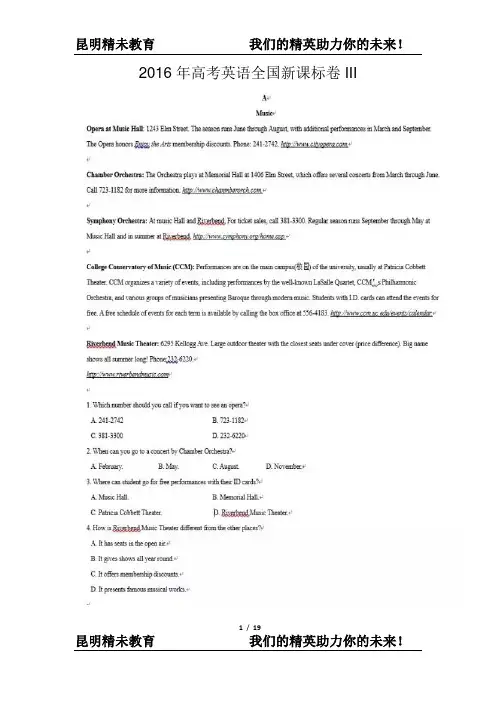
2016年高考英语全国新课标卷III1/ 192/ 193/ 194/ 195/ 196/ 197/ 198/ 19参考答案题号:1题目: Which number should you call if you want to see an opera?A. 241-2742 B. 723-1182C.381-3300 D. 232-6220 真题解析:细节理解题,难度简单,根据关键词opera定位到文章第一段,找到关键词opera,对应相应的电话号码。
答案为A知识能力要求:细节定位及信息匹配题号:2题目: When can you go to a concert by Chamber Orchestra?A.February. B. May. C. August. D. November. 真题解析:细节理解题,难度简单,根据关键词Chamber Orchestra定位到文章第二段,原文为“which offers several concerts from March through June.”句意为音乐会在3月至6月之间举办,排除选项得出答案为B 知识能力要求:细节定位及句意理解题号:3 题目: Where can student go for free performances with their I.D. cards?A. MusicHall. B. Memorial Hall.C. Patricia Cobbett9/ 19Theater. D. Riverbend Music Theater. 真题解析:细节理解题,难度较简单,可知题目问的是地点,根据关键词free performances定位到文章第四段,原文为“Students with I.D. cards can attend the events for free. ” 读完可知本句在重复题目,所以正确答案在关键信息附近,扩大范围阅读,得到信息“Performances are on the main campus(校园) of the university, usually at Patricia Cobbett Theater.” 故答案为C知识能力要求:细节理解及已定范围内的信息寻找题号:4 题目: How is Riverbend Music Theater different from the other places?A. It has seats in the open air.B. It gives shows all year round.C. It offers membership discounts.D. It presents famous musical works. 真题解析:细节理解题,难度中等,根据题目关键词“Riverbend Music Theater” 和“different from the other places”定位到文章最后一段,读完整段之后,结合之前段落读到的信息,可知不同点在于Riverbend Music Theater与其它地方的不同在于它在户外设有座位,故答案为A 知识能力要求:细节定位及全篇信息理解题号:5 题目: What happened when Welty was with her friends at the cafe?A. Two strangers joined her.B. Her childhood friends came in.C. A heavy rain ruined the dinner.D. Some people held a party there. 真题解析:细节理解题,难度偏难,根据题目中的关键词“Welty”和“at the cafe”可知文章第一段至第四段所发生的地点都在cafe中,阅读第一段至第四段,可知B,C选项未提及,由原文“They settled in at a comfortable East Side cafe and within minutes, another customer was approaching their table.”“When her dinner partner showed up, she also pulled up a chair.”可知对于Welty来说,这两个人都是stranger,故正确答案为A 知识能力要求:细节定位,较大范围内文章理解,阅读细致程度题号:6 题目: The underlined word “them” in Paragraph 6 refers to Welty’s ________.A. readers B. parties C. friends D. stories 真题解析:词意猜测题,难度中等,看到题目判断为代词词意猜测,所以勇敢向前文看,由前文中的句子“Now we believe your stories”可知them代指的是stories,故正确答案为D 知识能力要求:根据前文内容进行推测题号:7 题目: What can we learn about the characters in Welty’s fiction?A. They live in big cities.B. They are mostly women.C. They come from real life.D. They are pleasure seekers. 真题解析:推断题,难度中等,结合题目关键词fiction定位到文章倒数第二段,原文为“I don’t make them up,” she said of the characters in her fiction these last 50 or so yea rs. “I don’t have to.” 结合本句及前文可知Welty的故事都是来源于真实的生活,故正确答案为C 知识能力要求:结合文意及句意进行理解推测题号:8题目: What can people do at the apple events?A. Attend experts’ lecture. B. Visiting fruit-loving families. C. Plant fruit trees in an orchard. D. Taste many kinds of apples. 真题解析:本题为细节题,难度为容易。
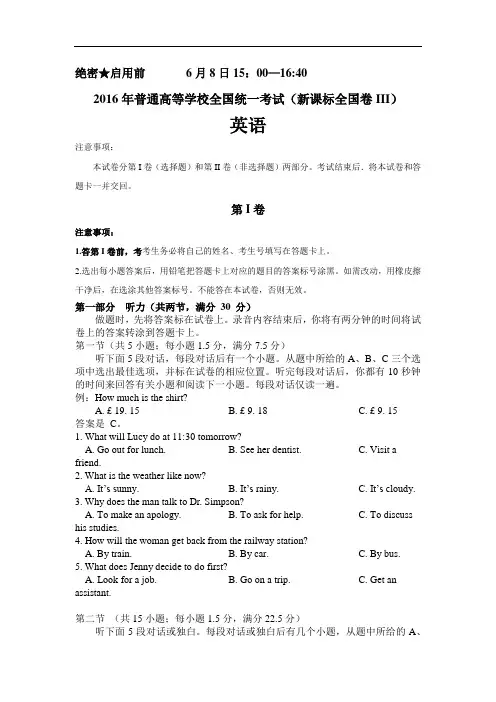
绝密★启用前6月8日15:00—16:402016年普通高等学校全国统一考试(新课标全国卷III)英语注意事项:本试卷分第I卷(选择题)和第II卷(非选择题)两部分。
考试结束后.将本试卷和答题卡一并交回。
第I卷注意事项:1.答第I卷前,考考生务必将自己的姓名、考生号填写在答题卡上。
2.选出每小题答案后,用铅笔把答题卡上对应的题目的答案标号涂黑。
如需改动,用橡皮擦干净后,在选涂其他答案标号。
不能答在本试卷,否则无效。
第一部分听力(共两节,满分30 分)做题时,先将答案标在试卷上。
录音内容结束后,你将有两分钟的时间将试卷上的答案转涂到答题卡上。
第一节(共5小题;每小题1.5分,满分7.5分)听下面5段对话,每段对话后有一个小题。
从题中所给的A、B、C三个选项中选出最佳选项,并标在试卷的相应位置。
听完每段对话后,你都有10秒钟的时间来回答有关小题和阅读下一小题。
每段对话仅读一遍。
例:How much is the shirt?A. £ 19. 15B. £ 9. 18C. £ 9. 15答案是C。
1. What will Lucy do at 11:30 tomorrow?A. Go out for lunch.B. See her dentist.C. Visit a friend.2. What is the weather like now?A. It’s sunny.B. It’s rainy.C. It’s cloudy.3. Why does the man talk to Dr. Simpson?A. To make an apology.B. To ask for help.C. To discuss his studies.4. How will the woman get back from the railway station?A. By train.B. By car.C. By bus.5. What does Jenny decide to do first?A. Look for a job.B. Go on a trip.C. Get an assistant.第二节(共15小题;每小题1.5分,满分22.5分)听下面5段对话或独白。
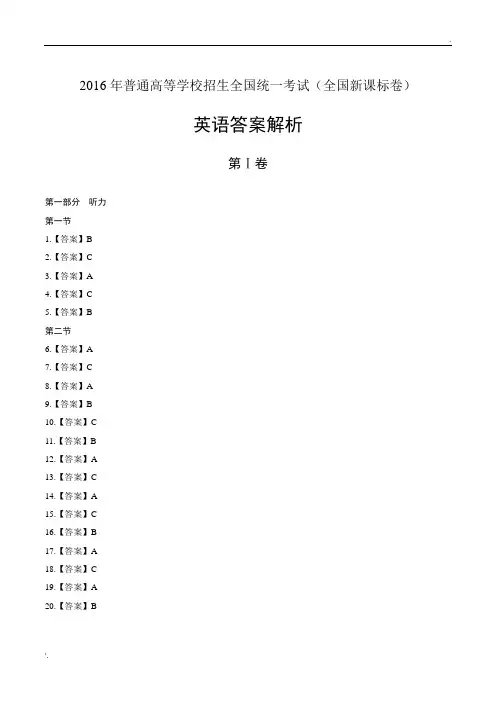
2016年普通高等学校招生全国统一考试(全国新课标卷)英语答案解析第Ⅰ卷第一部分听力第一节1.【答案】B2.【答案】C3.【答案】A4.【答案】C5.【答案】B第二节6.【答案】A7.【答案】C8.【答案】A9.【答案】B10.【答案】C11.【答案】B12.【答案】A13.【答案】C14.【答案】A15.【答案】C16.【答案】B17.【答案】A18.【答案】C19.【答案】A20.【答案】B第二部分阅读理解第一节21.【答案】A【解析】通读第一段内容并结合该段中的“Phone:241-2742.”可知,本段主要介绍了在音乐厅举办歌剧的相关信息,因此如果想看歌剧,可拨打这里的联系电话241-2742,故选A。
22.【答案】B【解析】根据第二段第一句Chamber Orchestra:The Orchestra plays at Memorial Hall at 1406 Elm Street,which offers several concerts from March through June.译文:内管弦乐队:在榆树街1406号的纪念堂会有管弦乐队的表演,从三月到六月有好几场演出。
可知,管弦乐队的演出时间为三月到六月,而五月份正好在此期间内。
故选B。
23.【答案】C【解析】根据第四段第一句可知,许多演出通常都会在Patricia Cobbett Theater进行;结合第四段第三句Students with ID cards can attend the events for free.译文:学生可持身份证免费观看。
可知,学生可在Patricia Cobbett Theater持身份证免费观看。
故选C。
24.【答案】A【解析】根据最后一段第二句Large outdoor theater with the closest seats under cover( price different) 译文:大型户外剧场具有最前排的(包厢)座位,隐秘性极好(价位不同)。
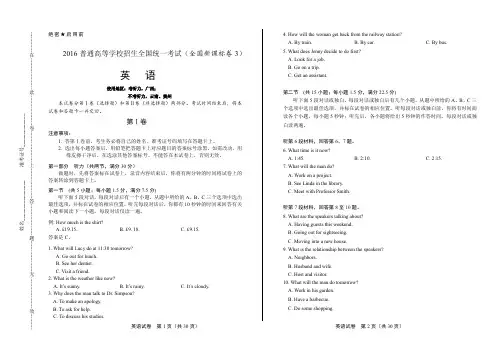
英语试卷 第1页(共30页)英语试卷 第2页(共30页)绝密★启用前 2016普通高等学校招生全国统一考试(全国新课标卷3)英语使用地区:考听力,广西;不考听力,云南、贵州本试卷分第Ⅰ卷(选择题)和第Ⅱ卷(非选择题)两部分。
考试时间结束后,将本试卷和答题卡一并交回。
第Ⅰ卷注意事项:1. 答第Ⅰ卷前,考生务必将自己的姓名、准考证号码填写在答题卡上。
2. 选出每小题答案后,用铅笔把答题卡上对应题目的答案标号涂黑。
如需改动,用橡皮擦干净后,在选涂其他答案标号。
不能答在本试卷上,否则无效。
第一部分 听力(共两节,满分30分)做题时,先将答案标在试卷上,录音内容结束后,你将有两分钟的时间将试卷上的答案转涂到答题卡上。
第一节 (共5小题;每小题1.5分,满分7.5分)听下面5段对话。
每段对话后有一个小题,从题中所给的A 、B 、C 三个选项中选出最佳选项,并标在试卷的相应位置。
听完每段对话后,你都有10秒钟的时间来回答有关小题和阅读下一小题。
每段对话仅读一遍。
例: How much is the shirt? A. £19.15. B. £9. 18. C. £9.15.答案是C 。
1. What will Lucy do at 11:30 tomorrow?A. Go out for lunch.B. See her dentist.C. Visit a friend.2. What is the weather like now? A. It’s sunny. B. It’s rainy.C. It’s cloudy.3. Why does the man talk to Dr. Simpson? A. To make an apology. B. To ask for help.C. To discuss his studies.4. How will the woman get back from the railway station? A. By train.B. By car.C. By bus.5. What does Jenny decide to do first? A. Look for a job. B. Go on a trip. C. Get an assistant.第二节 (共15小题;每小题1.5分,满分22.5分)听下面5段对话或独白。
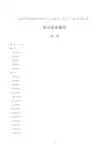
2016年普通高等学校招生全国统一考试(全国新课标卷)英语答案解析第Ⅰ卷第一部分听力第一节1.【答案】B2.【答案】C3.【答案】A4.【答案】C5.【答案】B第二节6.【答案】A7.【答案】C8.【答案】A9.【答案】B10.【答案】C11.【答案】B12.【答案】A13.【答案】C14.【答案】A15.【答案】C16.【答案】B17.【答案】A18.【答案】C19.【答案】A20.【答案】B第二部分阅读理解第一节21.【答案】A【解析】通读第一段内容并结合该段中的“Phone:241-2742.”可知,本段主要介绍了在音乐厅举办歌剧的相关信息,因此如果想看歌剧,可拨打这里的联系电话241-2742,故选A。
22.【答案】B【解析】根据第二段第一句Chamber Orchestra:The Orchestra plays at Memorial Hall at 1406 Elm Street,which offers several concerts from March through June.译文:内管弦乐队:在榆树街1406号的纪念堂会有管弦乐队的表演,从三月到六月有好几场演出。
可知,管弦乐队的演出时间为三月到六月,而五月份正好在此期间内。
故选B。
23.【答案】C【解析】根据第四段第一句可知,许多演出通常都会在Patricia Cobbett Theater进行;结合第四段第三句Students with ID cards can attend the events for free.译文:学生可持身份证免费观看。
可知,学生可在Patricia Cobbett Theater持身份证免费观看。
故选C。
24.【答案】A【解析】根据最后一段第二句Large outdoor theater with the closest seats under cover( price different) 译文:大型户外剧场具有最前排的(包厢)座位,隐秘性极好(价位不同)。
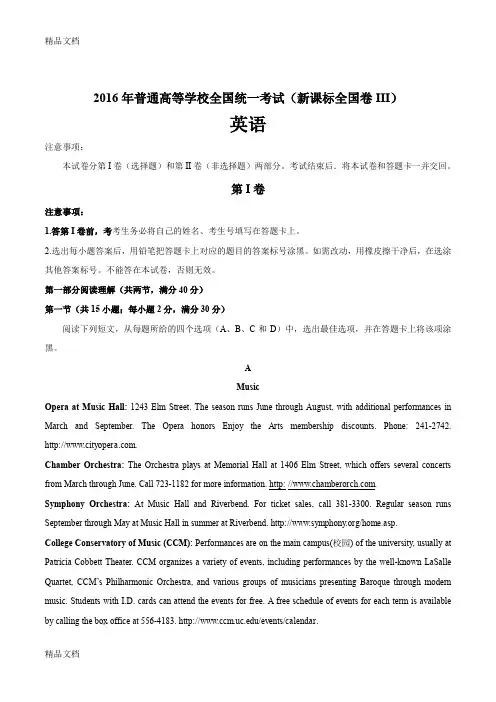
2016年普通高等学校全国统一考试(新课标全国卷III)英语注意事项:本试卷分第I卷(选择题)和第II卷(非选择题)两部分。
考试结束后.将本试卷和答题卡一并交回。
第I卷注意事项:1.答第I卷前,考考生务必将自己的姓名、考生号填写在答题卡上。
2.选出每小题答案后,用铅笔把答题卡上对应的题目的答案标号涂黑。
如需改动,用橡皮擦干净后,在选涂其他答案标号。
不能答在本试卷,否则无效。
第一部分阅读理解(共两节,满分40分)第一节(共15小题;每小题2分,满分30分)阅读下列短文,从每题所给的四个选项(A、B、C和D)中,选出最佳选项,并在答题卡上将该项涂黑。
AMusicOpera at Music Hall: 1243 Elm Street. The season runs June through August, with additional performances in March and September. The Opera honors Enjoy the Arts membership discounts. Phone: 241-2742. .Chamber Orchestra: The Orchestra plays at Memorial Hall at 1406 Elm Street, which offers several concerts from March through June. Call 723-1182 for more information. .Symphony Orchestra: At Music Hall and Riverbend. For ticket sales, call 381-3300. Regular season runs September through May at Music Hall in summer at Riverbend. /home.asp.College Conservatory of Music (CCM): Performances are on the main campus(校园) of the university, usually at Patricia Cobbett Theater. CCM organizes a variety of events, including performances by the well-known LaSalle Quartet, CCM’s Philharmonic Orchestra, and various groups of musicians presenting Baroque through modern music. Students with I.D. cards can attend the events for free. A free schedule of events for each term is available by calling the box office at 556-4183. /events/calendar.Riverbend Music Theater: 6295 Kellogg Ave. Large outdoor theater with the closest seats under cover (price difference).Big name shows all summer long! Phone:232-6220. .1. Which number should you call if you want to see an opera?A. 241-2742.B. 723-1182.C. 381-3300.D. 232-6220.2. When can you go to a concert by Chamber Orchestra?A. February.B. May.C. August.D. November.3.Where can students go for free performances with their I.D. cards?A. Music Hall.B. Memorial Hall.C. Patricia Cobbett Theater.D. Riverbend Music Theater.4. How is Riverbend Music Theater different from the other places?A. It has seats in the open air.B. It gives shows all year round.C. It offers membership discounts.D. It presents famous musical works.BOn one of her trips to New York several years ago, Eudora Welty decided to take a couple of New York friends out to dinner. They settled in at a comfortable East Side cafe and within minutes, another customer was approaching their table.“Hey, aren’t you from Mississippi?” the elegant, white-haired writer remembered being asked by the stranger. “I’m from Mississippi too.”Without a second thought, the woman joined the Welty party. When her dinner partner showed up, she also pulled up a chair.“They began telling me all the news of Mississippi,” Welty said. “I didn’t know what my New York friends were thinking.”Taxis on a rainy New York night are rarer than sunshine. By the time the group got up to leave, it was pouring outside. Welty’s new friends immediately sent a waiter to find a cab. Heading back downtown toward her hotel, her big-city friends were amazed at the turn of events that had changed their Big Apple dinner into a Mississippi.“My friends said: ‘Now we believe your stories,’” Welty added. “And I said: ‘Now you know. These are the people that make me write them.’”Sitting on a sofa in her room, Welty, a slim figure in a simple gray dress, looked pleased with this explanation.“I don’t make them up,” she said of the characters in her fiction these last 50 or so years. “I don’t have to.”Beauticians, bartenders, piano players and people with purple hats, Welty’s people come from afternoons spent visiting with old friends, from walks through the streets of her native Jackson, Miss., from conversations overheard on a bus. It annoys Welty that, at 78, her left ear has now given out. Sometimes, sitting on a bus or a train, she hears only a fragment(片段) of a particularly interesting story.5. What happened when Welty was with her friends at the cafe?A. Two strangers joined her.B. Her childhood friends came in.C. A heavy rain ruined the dinner.D. Some people held a party there.6. The underlined word “them” in Paragraph 6 refers to Welty’s .A. readersB. partiesC. friendsD. stories7. What can we learn about the characters in Welty’s fiction?A. They live in big cities.B. They are mostly women.C. They come from real life.D. They are pleasure seekers.CIf you are a fruit grower—or would like to become one—take advantage of Apple Day to see what’s around. It’s called Apple Day but in practice it’s more like Apple Month. The day itself is on October 21, but since it has caught on, events now spread out over most of October around Britain.Visiting an apple event is a good chance to see, and often taste, a wide variety of apples. To people who are used to the limited choice of apples such as Golden Delicious and Royal Gala in supermarkets, it can be quite an eye opener to see the range of classical apples still in existence, such as Decio which was grown by the Romans. Although it doesn’t taste of anything special, it’s still worth a try, as is the knobbly(多疙瘩的) Cat’s Head which is more of a curiosity than anything else.There are also varieties developed to suit specific local conditions. One of the very best varieties for eating quality is Orleans Reinette, but you’ll need a warm, sheltered place with perfect soil to grow it, so it’s a pipe dream for most apple lovers who fall for it.At the events, you can meet expert growers and discuss which ones will best suit your conditions, and because these are family affairs, children are well catered for with apple-themed fun and games.Apple Days are being held at all sorts of places with an interest in fruit, including stately gardens and commercial orchards(果园).If you want to have a real orchard experience, try visiting the National Fruit Collection at Brogdale, near Faversham in Kent.8.What can people do at the apple events?A. Attend experts’ lectures.B. Visit fruit-loving families.C. Plant fruit trees in an orchard.D. Taste many kinds of apples.9.What can we learn about Decio?A. It is a new variety.B. It has a strange look.C. It is rarely seen now.D. It has a special taste.10. What does the underlined phrase “a pipe dream” in Paragraph 3mean?A. A practical idea.B. A vain hope.C.A brilliant plan.D. A selfish desire.11.What is the author’s p urpose in writing the text?A. To show how to grow apples.B .To introduce an apple festival.C. To help people select apples.D. To promote apple research.DBad news sells. If it bleeds, it leads. No news is good news, and good news is no news. Those are the classic rules for the evening broadcasts and the morning papers. But now that information is being spread and monitored(监控) in different ways, researchers are discovering new rules. By tracking people’s e-mails and online posts, scientists have found that good news can spread faster and farther than disasters and sob stories.“The ‘if it bleeds’ rule works for mass media,” says Jonah Berger, a scholar at the University of Pennsylvania. “They want your eyeballs and don’t care how you’re feeling. But when you share a story with your friends, you care a lot more how they react. You don’t want them to think of you as a Debbie Downer.”Researchers analyzing word-of-mouth communication—e-mails, Web posts and reviews, face-to-face conversations—found that it tended to be more positive than negative(消极的), but that didn’t necessarily mean people preferred positive news. Was positive news shared more often simply because people experienced moregood things than bad things? To test for that possibility, Dr. Berger looked at how people spread a particular set of news stories: thousands of articles on The New York Times’ website. He and a Penn colleague analyzed the “most e-mailed” list for six months. One of his first find ings was that articles in the science section were much more likely to make the list than non-science articles. He found that science amazed Times’ readers and made them w ant to share this positive feeling with others.Readers also tended to share articles that were exciting or funny, or that inspired negative feelings like anger or anxiety, but not articles that left them merely sad. They needed to be aroused(激发) one way or the other, and they preferred good news to bad. The more positive an article, the more likely it was to be shared, as Dr. Berger explains in his new book, “Contagious: Why Things Catch On.”12 .What do the classic rules mentioned in the text apply to?A. News reports.B. Research papers.C .Private e-mails. D. Daily conversations.13. What can we infer about people like Debbie Downer?A. They’re socially inactive.B. They’re good at telling stories.C. They’re inconsiderate of others.D. They’re careful with their words.14.Which tended to be the most e-mailed according to Dr. Berger’s research?A . Sports new. B. Science articles.C. Personal accounts.D. Financial reviews.15 .What can be a suitable title for the text?A. Sad Stories Travel Far and WideB .Online News Attracts More PeopleC. Reading Habits Change with the TimesD. Good News Beats Bad on Social Networks第二节(共5小题;每小题2分,满分10分)根据短文内容,从短文后的选项中选出能填入空白处的最佳选项。
绝密★启用前6月8日15:00—16:402016年普通高等学校全国统一考试(新课标全国卷III)英语注意事项:本试卷分第I卷(选择题)和第II卷(非选择题)两部分。
考试结束后.将本试卷和答题卡一并交回。
第I卷注意事项:1.答第I卷前,考考生务必将自己的姓名、考生号填写在答题卡上。
2.选出每小题答案后,用铅笔把答题卡上对应的题目的答案标号涂黑。
如需改动,用橡皮擦干净后,在选涂其他答案标号。
不能答在本试卷,否则无效。
第一部分阅读理解(共两节,满分40分)第一节(共15小题;每小题2分,满分30分)阅读下列短文,从每题所给的四个选项(A、B、C和D)中,选出最佳选项,并在答题卡上将该项涂黑。
AMusicOpera at Music Hall: 1243 Elm Street. The season runs June through August, with additional performances in March and September. The Opera honors Enjoy the Arts membership discounts. Phone: 241-2742. .Chamber Orchestra: The Orchestra plays at Memorial Hall at 1406 Elm Street, which offers several concerts from March through June. Call 723-1182 for more information. http://. Symphony Orchestra: At Music Hall and Riverbend. For ticket sales, call 381-3300. Regular season runs September through May at Music Hall in summer at Riverbend.College Conservatory of Music (CCM): Performances are on the main campus(校园) of the university, usually at Patricia Cobbett Theater. CCM organizes a variety of events, including performances by the well-known LaSalle Quartet, CCM’s Philharmonic Orchestra, and various groups of musicians presenting Baroque through modern music. Students with I.D. cards canattend the events for free. A free schedule of events for each term is available by calling the box office at 556-4183.Riverbend Music Theater: 6295 Kellogg Ave. Large outdoor theater with the closest seats under cover (price difference).Big name shows all summer long! Phone:232-6220. .1. Which number should you call if you want to see an opera?A. 241-2742.B. 723-1182.C. 381-3300.D. 232-6220.2. When can you go to a concert by Chamber Orchestra?A. February.B. May.C. August.D. November.3.Where can students go for free performances with their I.D. cards?A. Music Hall.B. Memorial Hall.C. Patricia Cobbett Theater.D. Riverbend Music Theater.4. How is Riverbend Music Theater different from the other places?A. It has seats in the open air.B. It gives shows all year round.C. It offers membership discounts.D. It presents famous musical works.BOn one of her trips to New York several years ago, Eudora Welty decided to take a couple of New York friends out to dinner. They settled in at a comfortable East Side cafe and within minutes, another customer was approaching their table.“Hey, aren’t you from Mississippi?”the elegant, white-haired writer remembered being asked by the stranger. “I’m from Mississippi too.”Without a second thought, the woman joined the Welty party. When her dinner partner showed up, she also pulled up a chair.“They began telling me all the news of Mississippi,” Welty said. “I didn’t know what my New York friends were thinking.”Taxis on a rainy New York night are rarer than sunshine. By the time the group got up to leave, it was pouring outside. Welty’s new friends immediately sent a waiter to find a cab. Heading back downtown toward her hotel, her big-city friends were amazed at the turn of eventsthat had changed their Big Apple dinner into a Mississippi.“My friends said: ‘Now we believe your stories,’” Welty added. “And I said: ‘Now you know. These are the people that make me write them.’”Sitting on a sofa in her room, Welty, a slim figure in a simple gray dress, looked pleased with this explanation.“I don’t make them up,” she said of the characters in her fiction these last 50 or so years. “I don’t have to.”Beauticians, bartenders, piano players and people with purple hats, Welty’s people come from afternoons spent visiting with old friends, from walks through the streets of her native Jackson, Miss., from conversations overheard on a bus. It annoys Welty that, at 78, her left ear has now given out. Sometimes, sitting on a bus or a train, she hears only a fragment(片段) of a particularly interesting story.5. What happened when Welty was with her friends at the cafe?A. Two strangers joined her.B. Her childhood friends came in.C. A heavy rain ruined the dinner.D. Some people held a party there.6. The underlined word “them” in Paragraph 6 refers to Welty’s .A. readersB. partiesC. friendsD. stories7. What can we learn about the characters in Welty’s fiction?A. They live in big cities.B. They are mostly women.C. They come from real life.D. They are pleasure seekers.CIf you are a fruit grower—or would like to become one—take advantage of Apple Day to see what’s around. It’s called Apple Day but in practice it’s more like Apple Month. The day itself is on October 21, but since it has caught on, events now spread out over most of October around Britain.Visiting an apple event is a good chance to see, and often taste, a wide variety of apples. Topeople who are used to the limited choice of apples such as Golden Delicious and Royal Gala in supermarkets, it can be quite an eye opener to see the range of classical apples still in existence, such as Decio which was grown by the Romans. Although it doesn’t taste of anything special, it’s still worth a try, as is the knobbly(多疙瘩的) Cat’s Head which is more of a curiosity than anything else.There are also varieties developed to suit specific local conditions. One of the very best varieties for eating quality is Orleans Reinette, but you’ll need a warm, sheltered place with perfect soil to grow it, so it’s a pipe dream for most apple lovers who fall for it.At the events, you can meet expert growers and discuss which ones will best suit your conditions, and because these are family affairs, children are well catered for with apple-themed fun and games.Apple Days are being held at all sorts of places with an interest in fruit, including stately gardens and commercial orchards(果园).If you want to have a real orchard experience, try visiting the National Fruit Collection at Brogdale, near Faversham in Kent.8.What can people do at the apple events?A. Attend experts’ lectures.B. Visit fruit-loving families.C. Plant fruit trees in an orchard.D. Taste many kinds of apples.9.What can we learn about Decio?A. It is a new variety.B. It has a strange look.C. It is rarely seen now.D. It has a special taste.10. What does the underlined phrase “a pipe dream” in Paragraph 3mean?A. A practical idea.B. A vain hope.C.A brilliant plan.D. A selfish desire.11.What is the author’s p urpose in writing the text?A. To show how to grow apples.B .To introduce an apple festival.C. To help people select apples.D. To promote apple research.DBad news sells. If it bleeds, it leads. No news is good news, and good news is no news. Thoseare the classic rules for the evening broadcasts and the morning papers. But now that information is being spread and monitored(监控) in different ways, researchers are discovering new rules. By tracking people’s e-mails and online posts, scientists have found that good news can spread faster and farther than disasters and sob stories.“The ‘if it bleeds’ rule works for mass media,” says Jonah Berger, a scholar at the University of Pennsylvania. “They want your eyeballs and don’t care how you’re feeling. But when you share a story with your friends, you care a lot more how they react. You don’t want them to think of you as a Debbie Downer.”Researchers analyzing word-of-mouth communication—e-mails, Web posts and reviews, face-to-face conversations—found that it tended to be more positive than negative(消极的), but that didn’t necessarily mean people preferred positive news. Was positive news shared more often simply because people experienced more good things than bad things? To test for that possibility, Dr. Berger looked at how people spread a particular set of news stories: thousands of articles on The New York Times’ website. He and a Penn colleague analyzed the “most e-mailed” list for six months. One of his first findings was that articles in the science section were much more likely to make the list than non-science articles. He found that science amazed Times’ readers and made them want to share this positive feeling with others.Readers also tended to share articles that were exciting or funny, or that inspired negative feelings like anger or anxiety, but not articles that left them merely sad. They needed to be aroused(激发) one way or the other, and they preferred good news to bad. The more positive an article, the more likely i t was to be shared, as Dr. Berger explains in his new book, “Contagious: Why Things Catch On.”12 .What do the classic rules mentioned in the text apply to?A. News reports.B. Research papers.C .Private e-mails. D. Daily conversations.13. What can we infer about people like Debbie Downer?A. They’re socially inactive.B. They’re good at telling stories.C. They’re inconsiderate of others.D. They’re careful with their words.14.Which tended to be the most e-mailed according to Dr. Berger’s research?A . Sports new. B. Science articles.C. Personal accounts.D. Financial reviews.15 .What can be a suitable title for the text?A. Sad Stories Travel Far and WideB .Online News Attracts More PeopleC. Reading Habits Change with the TimesD. Good News Beats Bad on Social Networks第二节(共5小题;每小题2分,满分10分)根据短文内容,从短文后的选项中选出能填入空白处的最佳选项。
绝密★启用前6月8日15:00—16:402016年普通高等学校全国统一考试(新课标全国卷III)英语注意事项:本试卷分第I卷(选择题)和第II卷(非选择题)两部分。
考试结束后.将本试卷和答题卡一并交回。
第I卷注意事项:1.答第I卷前,考2.第一部分听力(共两节,满分30分)做题时,先将答案标在试卷上。
答题卡上。
第一节(共5小题;每小题1.5分,满分听下面5段对话,每段对话后有一个小题。
例:A.£ C.£9.15答案是C.Visitafriend.C.It’scloudy.A.Tomakeanapology.B.Toaskforhelp.C.Todiscusshisstudies.4.Howwillthewomangetbackfromtherailwaystation?A.Bytrain.B.Bycar.C.Bybus.5.WhatdoesJennydecidetodofirst?A.Lookforajob.B.Goonatrip.C.Getanassistant.第二节(共15小题;每小题1.5分,满分22.5分)听下面5段对话或独白。
每段对话或独白后有几个小题,从题中所给的A、B、C三个选项中选出最佳选项,并标在试卷的相应位置。
听每段对话或独白前,你将有时间阅读各个小题,每小题5秒钟;听完后,各小题将给出5秒钟的作答时间。
每段对话或独白读两遍。
听第6段材料,回答第6、7题。
6.Whattimeisitnow?A.1:45.B.2:10.C.2:15.7.Whatwillthemando?A.Workonaproject.B.SeeLindainthelibrary.C.MeetwithProfessorSmith.听第7段材料,回答第8至10题。
8.Whatarethespeakerstalkingabout?AHavinggueststhisweekend.B.Goingoutforsightseeing.C.Movingintoanewhouse.听第8C.InKansas.C.Reading.C.Nature.听第9A.Toattendatrainingprogram.B.Tocarryoutsomeresearch.C.Totakeavacation.15.HowlongwillDorothystayinEurope?A.Afewdays.B.Twoweeks.C.Threemonths.16.WhatdoesDorothythinkofherapartment?A.It’sexpensive.B.It’ssatisfactory.C.It'sinconvenient.17WhatdoesBilloffertodoforDorothy?A.RecommendherapartmenttoJim.B.Findanewapartmentforher.C.Takecareofherapartment.听第10段材料,回答第18至20题。
绝密★启用前6月8日15:00——16:402016年普通高等学校招生全国统一考试英语本试卷分第Ⅰ卷(选择题)和第Ⅱ卷(非选择题)两部分。
考试结束后,将本试卷和答题卡一并交回。
第Ⅰ卷注意事项:1.答第Ⅰ卷前,考生务必将自己的姓名、准考证号填写清楚,写在答题卡上。
2.选出每小题答案后,用铅笔把答题卡上对应题目的答案标号涂黑。
如需改动,用橡皮擦干净后,再选涂其他答案标号。
不能答在本试卷上,否则无效。
第一部分阅读理解(共两节,满分40分)第一节(共15小题;每小题2分,满分30分)阅读下列短文,从媒体所给的四个选项(A、B、C和D)中,选出最佳选项,并在答题卡上将该项涂黑。
AmusicOpera at Music Hall:1243 Elm Street.The season runs June through August, with additional performances in March and September. The Opera honors Enjoy the Arts membership discounts. Phone: 241-2742. .Chamber Orchestra: The Orchestra plays at Memorial Hall at 1406 Elm Street, which offers several concerts from March through June. Call 723-1182 for more information. .Symphony Orchestra: At Music Hall and Riverbend. For ticket sales, call 381-3300. Regular season runs September through May at Music Hall and in summer at Riverbend./home.asp.College Conservatory of Music (CCM): Performances are on the main campus(校园)of the university, usually at Patricia Cobbett Theater. CCM organizes a variety of events, including performances by the well-known LaSalle. Quartet, CCM's Philharmonic Orchestra, and various groups of musicians presenting Baroque through modem music. Students with I.D.cards can attend the events for free.A free schedule of events for each term is available by calling the box office at 556-4183./events/calendar.Riverbend Music Theater: 6295 Kellogg rge outdoor theater with the closest seats under cover (price difference),Big nameshow all summer long ! Phone: 2326220. http://www.riverbe.1.Which number should you call if you want to see an opera?A.241-2742.B.723-1182C.381-3300D.232-6220.2. When can you go to a concert by Chamber Orchestra?A. February.B. May.C. August.D. November.3. Where can students go for free performances with their I.D. cards?A. Music Hall.B. Memorial Hall.C. Patricia Cobbctt Theater.D. Riverbend Music Theater.4. How is Riverbend Music Theater different from the other places?A. It has seats in the open air.B. It givcs shows all year round.C. It offers membership discounts.D. It presents famous musical works.BOn one of her trips to New York several years ago, Eudora Welty decided to take acouple of New York friends out to dinner. They settled in at a comfortable East Side cafe and within minutes, another customer was approaching their table."Hey, aren't you from Mississippi?" the elegant, white-haired writer remembered being asked by the strangger. "I'm from Mississippi too.""They began telling me all the news of Mississippi,” Welty said. "I didn't know what my New York friends were thinking."Taxis on a rainy New York night are rarer than sunshine.By the time group got up to leave, it was pouring outside. Welty’s new friends immediately sent a waiter to find a cab. Heading back downtown toward her hotel, her big-city friends were amazed at the turn of events that had changed their Big Apple dinner into"My friend said: 'Now we believe your stories,'"Welty added,"And I said :'Now you know,these are the people that make me write them.'"Sitting on a sofa in her room,Welty, asilm figure in a simple gray dress, looked pleased with this explanation."I don't makt them up", she said of the characters in her fiction these last 50 or so years."I don't have to."Beauticians,bartenders,piano players and poeple wiht people hats,Welty's people come from afternoons spent vistiting with old friends, from walks thtough the streets of her native Jackson,Miss.,from conversations overheard on a bus.It annoys Welty that,at 78,her left ear has now given out.Sometimes,sitting on a bus or a train, sht hears only a fragment(片断)偶发啊particularly interesting story.5.What happpened when Welty was with her friends at the cafe?A.Two strangers joined her.B.Her childhood friends came in.C.A heavy rain ruined the dinner.D.Some people held a party there.6. The underlined word “them” in Paragraph 6 refers to Welty’sA. readersB. partiesC. friendsD. stories7. What can we learn about the characters in Welty's fiction;A. They live in big cities.B. They are mostly women.C. They come from real life.D. They are pleasure seekers.CIf you are a fruit grower一or would like to become one一take advantage of Apple Day to see what's around. It's called Apple Day but in practice it's more like Apple Month. The day itself is on October 21, but since it has caught on, events now spread out over most of Octoberaround Britain.Visiting an apple event is a good chance to see, and often taste, a wide variety of apples To people who are used to the limited choice of apples such as Golden Delicious and Royal ,Gala in supermarkets, it can be quite an eye opener to see the range of classical apples still in existence, such as Decio which was grown by the Romans. Although it doesn't taste ofanything special, it's still worth a try, as is the knobbly(多疙瘩的)Cat's Head which is moreof a curiosity than anything else.There are also varieties developed to suit specific local conditions. One of the very bestvarieties for eating quality is Orleans Reinette, but you'll need a warm, sheltered place withperfect soil to grow it, so it's a pipe dream for most apple lovers who fall for it.At the events, you can meet expert growers and discuss which ones will best suit your conditions, and because these are family affairs,children are well catered for with apple-Chemed fun and games.Apple Days are being held at all sorts of places with an interest in fruit, including stately gardens and commercial orchards(果园)·If you want to have a real orchard experience, try visiting the National Fruit Collection at Brogdale, near Faversham in Kent.8.What can people do at the apple events?A. Attend experts' lectures.B. Visit fruit-loving families.C. Plant fruit trees in an orchard.D. Taste many kinds of apples.9. What can we learn about Decio?A. It is a new variety.B. It has a strange look.C. It is rarely seen now.D. It has a special taste.10. What does the underlined phrase "a pipe dream" in Paragraph 3 mean?A. A practical idea.B. A vain hope.C. A brilliant plan.D. A selfish desire.11. What is the author's purpose in writing the text?A. To show how to grow apples.B. To introduce an apple festival.C. To help people select apples.D. To promote apple research.DBad new sells.If it bleeds,it leads. No news is good news, and good news is。
绝密★启用前6月8日15:00—16:402016年普通高等学校全国统一考试(新课标全国卷III)英语注意事项:试卷分第I卷(选择题)和第II卷(非选择题)两部分。
考试结束后.将本试卷和答题卡一并交回。
第I卷注意事项:1.答第I卷前,考考生务必将自己的姓名、考生号填写在答题卡上。
2.选出每小题答案后,用铅笔把答题卡上对应的题目的答案标号涂黑。
如需改动,用橡皮擦干净后,在选涂其他答案标号。
不能答在本试卷,否则无效。
读下列短文,从每题所给的四个选项(A、B、C和D)中,选出最佳选项,并在答题卡上将该项涂黑。
AMusicOpera at Music Hall: 1243 Elm Street. The season runs June through August, with additional performances in March and September. The Opera honors Enjoy the Arts membership discounts. Phone: 241-2742. .Chamber Orchestra: The Orchestra plays at Memorial Hall at 1406 Elm Street, which offers several concerts from March through June. Call 723-1182 for more information. .Symphony Orchestra: At Music Hall and Riverbend. For ticket sales, call 381-3300. Regular season runs September through May at Music Hall in summer at Riverbend. /home.asp.College Conservatory of Music (CCM): Performances are on the main campus(校园) of the university, usually at Patricia Cobbett Theater. CCM organizes a variety of events, including performances by the well-known LaSalle Quartet, CCM’s Philharmonic Orchestra, and various groups of musicians presenting Baroque through modern music. Students with I.D. cards can attend the events for free. A free schedule of events for each term is available by calling the box office at 556-4183. /events/calendar.Riverbend Music Theater: 6295 Kellogg Ave. Large outdoor theater with the closest seats under cover (pricedifference).Big name shows all summer long! Phone:232-6220. .1. Which number should you call if you want to see an opera?A. 241-2742.B. 723-1182.C. 381-3300.D. 232-6220.2. When can you go to a concert by Chamber Orchestra?. February. B. May. C. August. D. November.3.Where can students go for free performances with their I.D. cards?. Music Hall. B. Memorial Hall.. Patricia Cobbett Theater. D. Riverbend Music Theater.4. How is Riverbend Music Theater different from the other places?. It has seats in the open air.. It gives shows all year round.. It offers membership discounts.. It presents famous musical works.BOn one of her trips to New York several years ago, Eudora Welty decided to take a couple of New York friends out to dinner. They settled in at a comfortable East Side cafe and within minutes, another customer was approaching their table.“Hey, aren’t you from Mississippi?” the elegant, white-haired writer remembered being asked by the stranger. “I’m from Mississippi too.”Without a second thought, the woman joined the Welty party. When her dinner partner showed up, she also pulled up a chair.“They began telling me all the news of Mississippi,” Welty said. “I didn’t know what my New York friends were thinking.”Taxis on a rainy New York night are rarer than sunshine. By the time the group got up to leave, it was pouring outsi de. Welty’s new friends immediately sent a waiter to find a cab. Heading back downtown toward her hotel, her big-city friends were amazed at the turn of events that had changed their Big Apple dinner into a Mississippi.“My friends said: ‘Now we believe your stories,’” Welty added. “And I said: ‘Now you know. These are the people that make me write them.’”Sitting on a sofa in her room, Welty, a slim figure in a simple gray dress, looked pleased with this explanation.“I don’t make them up,” she said of the characters in her fiction these last 50 or so years. “I don’t have to.”Beauticians, bartenders, piano players and people with purple hats, Welty’s people come from afternoons spent visiting with old friends, from walks through the streets of her native Jackson, Miss., from conversations overheard on a bus. It annoys Welty that, at 78, her left ear has now given out. Sometimes, sitting on a bus or a train, she hears only a fragment(片段) of a particularly interesting story.5. What happened when Welty was with her friends at the cafe?. Two strangers joined her.. Her childhood friends came in.C. A heavy rain ruined the dinner.. Some people held a party there.6. The underlined word “them” in Paragraph 6 refers to Welty’s.. readers B. parties C. friends D. stories7. What can we learn about the characters in Welty’s fiction?A. They live in big cities.B. They are mostly women.C. They come from real life.D. They are pleasure seekers.Cf you are a fruit grower—or would like to become one—take advantage of Apple Day to see what’s around. It’s called Apple Day but in practice it’s more like Apple Month. The day itself is on October 21, but since it has caught on, events now spread out over most of October around Britain.isiting an apple event is a good chance to see, and often taste, a wide variety of apples. To people who are used to the limited choice of apples such as Golden Delicious and Royal Gala in supermarkets, it can be quite an eye opener to see the range of classical apples still in existence, such as Decio which was grown by the Romans. Although it doesn’t taste of anything special, it’s still worth a try, as is the knobbly(多疙瘩的) Cat’s Head which is more of a curiosity than anything else.here are also varieties developed to suit specific local conditions. One of the very best varieties for eating quality is Orleans Reinette, but you’ll need a warm, sheltered place with perfect soil to grow it, so it’s a pipe dream for mostapple lovers who fall for it.At the events, you can meet expert growers and discuss which ones will best suit your conditions, and because these are family affairs, children are well catered for with apple-themed fun and games.pple Days are being held at all sorts of places with an interest in fruit, including stately gardens and commercial orchards(果园).If you want to have a real orchard experience, try visiting the National Fruit Collection at Brogdale, near Faversham in Kent.8.What can people do at the apple events?A. Attend experts’ l ectures.B. Visit fruit-loving families.C. Plant fruit trees in an orchard.D. Taste many kinds of apples.9.What can we learn about Decio?. It is a new variety. B. It has a strange look.C. It is rarely seen now.D. It has a special taste.10. What does the underlined phrase “a pipe dream” in Paragraph 3mean?A. A practical idea.B. A vain hope..A brilliant plan. D. A selfish desire.11.What is the author’s purpose in writing the text?. To show how to grow apples..To introduce an apple festival.. To help people select apples.. To promote apple research.Dad news sells. If it bleeds, it leads. No news is good news, and good news is no news. Those are the classic rules for the evening broadcasts and the morning papers. But now that information is being spread and monitored(监控) in different ways, researchers are discovering new rules. By tracking people’s e-mails and online posts, scientists have found that good news can spread faster and farther than disasters and sob stories.“The ‘if it bleeds’ rule works for mass media,” says Jonah Berger, a scholar at the University of Pennsylvania. “They want your eyeballs and don’t care how you’re feeling. But when you share a story with your friends, you care a lot more how they react. You don’t want them to think of you as a Debbie Downer.”Researchers analyzing word-of-mouth communication—e-mails, Web posts and reviews, face-to-face conversations—found that it tended to be more positive than negative(消极的), but that didn’t necessarily mean people preferred positive news. Was positive news shared more often simply because people experienced more good things than bad things? To test for that possibility, Dr. Berger looked at how people spread a particular set of news stories: thousands of articles on The New York Times’ website. He and a Penn colleague analyzed the “most e-mailed” list for six months. One of his first findings was that articles in the science section were much more likely to make the list than non-science articles. He found that science amazed Times’ readers and made them want to share this positive feeling with others.Readers also tended to share articles that were exciting or funny, or that inspired negative feelings like anger or anxiety, but not articles that left them merely sad. They needed to be aroused(激发) one way or the other, and they preferred good news to bad. The more positive an article, the more likely it was to be shared, as Dr. Berger explains in his new book, “Contagious: Why Things Catch On.”12 .What do the classic rules mentioned in the text apply to?. News reports. B. Research papers..Private e-mails. D. Daily conversations.13. What can we infer about people like Debbie Downer?. They’re socially inactive.. They’re good at telling stories.. They’re inconsiderate of others.. They’re careful with their words.14.Which tended to be the most e-mailed according to Dr. Berger’s research?. Sports new. B. Science articles.. Personal accounts. D. Financial reviews.15 .What can be a suitable title for the text?. Sad Stories Travel Far and Wide.Online News Attracts More People. Reading Habits Change with the Times. Good News Beats Bad on Social Networks第二节(共5小题;每小题2分,满分10分)据短文内容,从短文后的选项中选出能填入空白处的最佳选项。
绝密★启封前2016普通高等学校招生全国统一考试(新课标I)英语试卷类型A第Ⅰ卷第一部分听力(共两节,满分30 分)做题时,现将答案标在试卷上,录音内容结束后,你将有两分钟的时间将试卷上的答案转涂到答题卡上。
第一节(共5小题;每小题1.5分,满分7.5分)听下面5段对话,每段对话后有一个小题。
从题中所给的A、B、C三个选项中选出最佳选项,并标在试卷的相应位置。
听完每段对话后,你都有10秒钟的时间来回答有关小题和阅读下一小题。
每段对话仅读一遍。
例:How much is the shirt?A. £ 19. 15B. £ 9. 18C. £ 9. 15答案是C。
1. What are the speakers talking about?A. Having a birthday party.B. Doing some exercise.C. Getting Lydia a gift.2. What is the woman going to do?A. Help the man.B. Take a bus.C. Get a camera.3. What does the woman suggest the man do?A. Tell Kate to stop.B. Call Kate, s friends.C. Stay away from Kate.4. Where does the conversation probably take place?A. In a wine shop.B. In a supermarket.C. In a restaurant.5. What does the woman mean?A. Keep the window closed.B. Go out for fresh air.C. Turn on the fan.听第6段材料,回答第6、7题。
2016年高考英语全国新课标卷III参考答案题号:1题目: Which number should you call if you want to see an opera?A. 241-2742 B. 723-1182C.381-3300 D. 232-6220 真题解析:细节理解题,难度简单,根据关键词opera定位到文章第一段,找到关键词opera,对应相应的。
答案为A知识能力要求:细节定位及信息匹配题号:2题目: When can you go to a concert by Chamber Orchestra?A.February. B. May. C. August. D. November. 真题解析:细节理解题,难度简单,根据关键词Chamber Orchestra定位到文章第二段,原文为“which offers several concerts from March throu gh June.”句意为音乐会在3月至6月之间举办,排除选项得出答案为B 知识能力要求:细节定位及句意理解题号:3 题目: Where can student go for free performances with their I.D. cards?A. MusicHall. B. Memorial Hall.C. Patricia Cobbett Theater. D. Riverbend Music Theater. 真题解析:细节理解题,难度较简单,可知题目问的是地点,根据关键词free performances定位到文章第四段,原文为“Students with I.D. cards can attend the events for free. ” 读完可知本句在重复题目,所以正确答案在关键信息附近,扩大围阅读,得到信息“Performances are on the main campus(校园) of the university, usually at Patricia Cobbett Theater.”故答案为C知识能力要求:细节理解及已定围的信息寻找题号:4 题目: How is Riverbend Music Theater different from the other places?A. It has seats in the open air.B. It gives shows all year round.C. It offers membership discounts.D. It presents famous musical works. 真题解析:细节理解题,难度中等,根据题目关键词“Riverbend Music Theater” 和“different from the other places”定位到文章最后一段,读完整段之后,结合之前段落读到的信息,可知不同点在于Riverbend Music Theater与其它地方的不同在于它在户外设有座位,故答案为A 知识能力要求:细节定位及全篇信息理解题号:5 题目: What happened when Welty was with her friends at the cafe?A. Two strangers joined her.B. Her childhood friends came in.C. A heavy rain ruined the dinner.D. Some people held a party there. 真题解析:细节理解题,难度偏难,根据题目中的关键词“Welty”和“at the cafe”可知文章第一段至第四段所发生的地点都在cafe中,阅读第一段至第四段,可知B,C选项未提及,由原文“They settled in at a comfortable East Side cafe and within minutes, another customer was approaching their table.”“When her dinner partner showed up, she also pulled up a chair.”可知对于Welty来说,这两个人都是stranger,故正确答案为A 知识能力要求:细节定位,较大围文章理解,阅读细致程度题号:6 题目:The underlined word “them” in Paragraph 6 refers to Welty’s ________.A. readers B. parties C. friends D. stories 真题解析:词意猜测题,难度中等,看到题目判断为代词词意猜测,所以勇敢向前文看,由前文中的句子“Now we believe your stories”可知them代指的是stories,故正确答案为D 知识能力要求:根据前文容进行推测题号:7 题目: What can we learn about the characters in Welty’s fiction?A. They live in big cities.B. They are mostly women.C. They come from real life.D. They are pleasure seekers. 真题解析:推断题,难度中等,结合题目关键词fiction定位到文章倒数第二段,原文为“I don’t make them up,” she said of the characters in he r fiction these last 50 or so years. “I don’t have to.” 结合本句及前文可知Welty的故事都是来源于真实的生活,故正确答案为C 知识能力要求:结合文意及句意进行理解推测题号:8题目: What can people do at the apple events?A. Attend experts’ lecture. B. Visiting fruit-loving families. C. Plant fruit trees in an orchard. D. Taste many kinds of apples. 真题解析:本题为细节题,难度为容易。
定位关键词apple events,找到文章第二段第一句话:Visiting an apple event is a good chance to see, and often taste, a wide variety of apples. 对照选项为D项,many kinds of 同义替换a wide variety of。
知识能力要求:细节理解题号:9题目: What can we learn about Decio?A. It is a new variety. B. It has a strange look.C. It is rarely seen now. D. It has a special taste. 真题解析:本题为细节题,难度为容易。
定位关键词Decio,找到文章第二段第4行,关键词所在句子没有对应选项,根据就近原则继续读下一句话:Although it doe sn’t taste of anything special, it’s still worth a try, as it the knobbly (多疙瘩的) Cat’s Head which is more of a curiosity than anything else. 特别强调其外表与众不同,选项正确答案B。
知识能力要求:细节理解题号:10题目:What does the underlined phrase “a pipe dream” in Paragraph 3 mean?A. A practical idea. B. A vain hope.C. A brilliant plan. D. A selfish desire. 真题解析:词义猜测题,难度为中等。
词义猜测一般在放在语境中结合上下文来解答。
One of the very best varieties for eating quality is Orleans Reinette, but you’l l need a warm, sheltered place with perfect soil to grow it, so it’s a pipe dream for most apple lovers who fall for it. 定位句中说到一种口感非常出色苹果,但是对种植要求很高,对于苹果爱好者来说只能是一个pipe dream,所以正确答案为B。
知识能力要求:语境结合阅读理解能力,同时要知道vain的意思。
题号:11题目:What is the author’s purpo se in writing the text?A. To show how to grow apples.B. To introduce an apple festival.C. To help people select apples.D. To promote apple research. 真题解析:主旨大意题,询问作者写作意图。
主旨题定位一般看首段和尾段,再结合其它细节题,可以看出作者的目的是向读者介绍名为Apple Day的节日。
知识能力要求:写作意图理解题号:12题目: What do the classic rules mentioned in the text apply to?A. News report. B. Research papers. C. Privates. D. Daily conversations. 真题解析:细节题,难度容易。
题目询问文章中提到的经典规律用于哪个方面,关键词classic rules定位文章第一段第二句话,Those are the classic rules for the evening broadcast and the morning papers. 选项为A项。
知识能力要求:细节理解题号:13 题目: What can we infer about people like Debbie Downer?A. They’re socially inactive.B. They’re good at telling stories.C. They’re inconsiderate of others.D. They’re careful with their wo rds. 真题解析:推断题,难度中等。